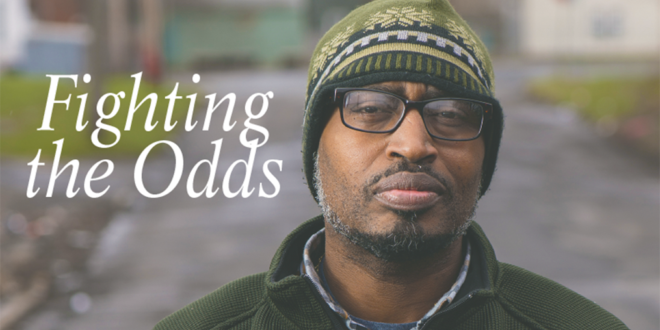How one man’s past led him to create a brighter future for others coming home from prison
Charles Rivers tore through a dark backyard, trying to shake a police pursuit. But they would catch up — as they always had.
Part of him even wanted that, he says today, recalling what he felt as a great sense of relief. Relief for the escape prison would offer from constant crime, partying and drugs. He sat in the back of a police car, exhausted, almost happy.
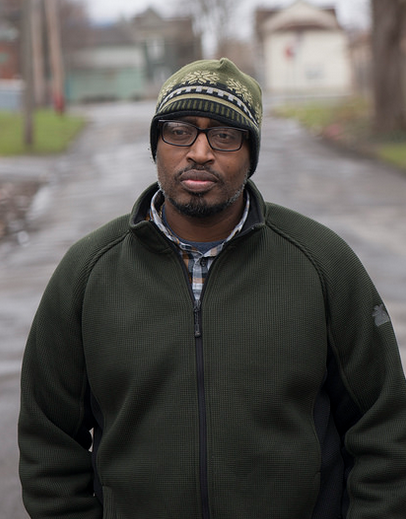
“I wasn’t necessarily runnin’ from the police, I was runnin’ from myself,” he said. “Jail was an escape for me.”
It was 2007, and the epiphany helped Rivers come to terms with being caught and sent to jail for the third time in his life.
Rivers thought the charges were harsh and challenged them, but his lawyer warned that as a repeat offender he faced up to a quarter-century of time. Somehow, Rivers says, he walked out with much less. He remembers that feeling of relief, again, this time tears running down his face.
“I wasn’t worried. I prayed. I asked God: ‘If you show me my life is in your hands, I’ll worship you every day of my life,’” he said. “And I sincerely meant that. Next day, I went in. I was sentenced to seven years.”
That was the last time Rivers went to prison. He walked out in 2012, and in the four years since, he got a steady job, bought a home and continued his education.
He wanted to close the chapter on crime the last time he went behind bars, and he has. The new chapter? A life helping others, some no doubt on a path like his when life went wrong: Kids with no dad at home, kids skipping school, kids already in trouble. Single parents unable to help — unequipped to help.
Rivers understands how hard it is to avoid a life of crime and then break out of it. Day by day at PEACE Inc., he offers the kind of help and support that could help some avoid a life of crime, and others fight their way out of it through programs such as one that offers support to ex-cons who are re-entering life on the outside.
“Everything that happened in my life is administered in the services given out at this center — not eating right, not budgeting, not managing re-entry,” Rivers said. “It was a struggle coming back out into society.”
The struggle continues for many.
Providing for his community
Rivers moved slowly, but seemed to be everywhere at once at PEACE Inc.’s Emma L. Johnston Southside Family Resource Center one day in April 2018. A fraternity from Syracuse University had arranged for some barbers to provide free haircuts and food at the center that day. Men and women were flocking in and out, writing their names forcefully on the center’s sign-in sheet.
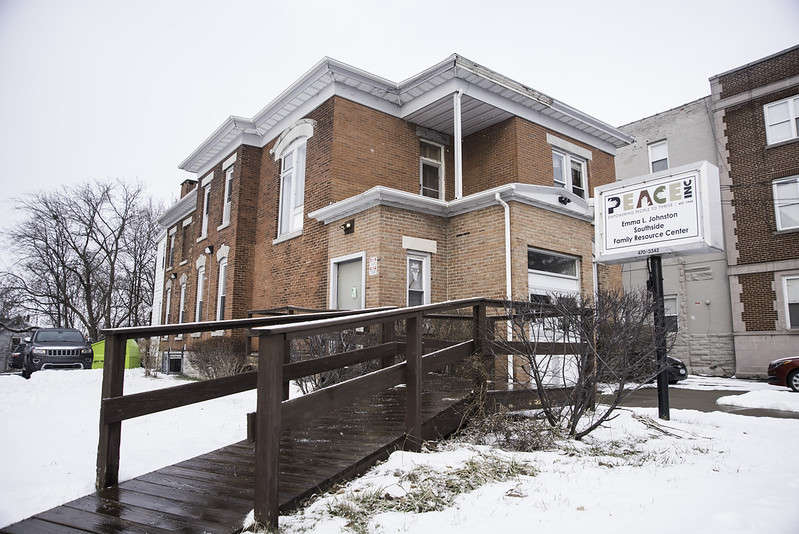
The sheet filled up quickly, and Rivers, the center’s coordinator, was the one fiddling with the printer to generate another page to accommodate the crush. He dove into his office and handed out a power strip when the barbers asked. He snuck out an extra box of raisins to a man who had stopped by the center for food. His wide smile showed the gaps between his teeth and his beanie cap betrayed the sparse hairs on his head. When a joke tickled him just right, his laugh bounced off the walls he had redesigned.
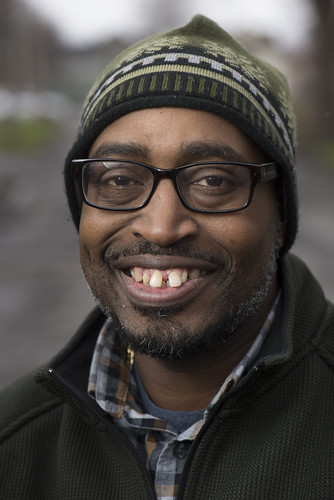 Moving in and out, he tried to make sure all the promised haircuts were given, and all the families were being provided for. Feeding hungry families is one of the center’s main commitments, as the steadily depleting stock of bread loaves at the center indicated. Quality, affordable food is sometimes tough to find on the South Side, a high-poverty neighborhood that’s been categorized as a “food desert.” Rivers takes care of the sprawling pantry upstairs.
Moving in and out, he tried to make sure all the promised haircuts were given, and all the families were being provided for. Feeding hungry families is one of the center’s main commitments, as the steadily depleting stock of bread loaves at the center indicated. Quality, affordable food is sometimes tough to find on the South Side, a high-poverty neighborhood that’s been categorized as a “food desert.” Rivers takes care of the sprawling pantry upstairs.
Family development is especially important to Rivers, who grew up without a male mentor in his own life. He was his mother’s only son and his father’s youngest, and was raised by his mother alone in Newark, New Jersey, before they moved to Syracuse when he was 13 or 14. Here, he stopped going to school, and prison soon replaced the classroom. Though he didn’t spend much time at school anymore, the value of education stayed with him through the years, and the epiphany he had in prison — the relief from a reduced sentence and a spiritual re-awakening — propelled his journey back to books.
The Rivers of today has a near-obsession with education. He worked three part-time jobs and took classes at two different schools before he took on the full-time job of program coordinator at PEACE. He has a master’s degree in human service management and in criminal justice. Besides that, he’s also a certified alcohol and substance abuse counselor through SUNY Empire State College’s Credentialed Alcoholism and Substance Abuse Counselor (CASAC) program.
At PEACE, Rivers is hoping to build a renewed support network for people re-entering society and seeking stability. A man who had come in for a haircut met Rivers for the first time, and at Rivers’ prodding promised to return to get help with a job. Rivers, in the meantime, headed out to shepherd others back to the center in his red van for the free haircuts.
“The mission and goal is to help individuals become empowered with the goal of them being self-sufficient,” he said. “Some people need more help than others. It’s like letting a baby bird go — either you gonna fly and survive, or not fly and die.”
Expanding family support
Systemic inequalities and racial injustice are only one part of the problem for him and others, Rivers believes. Parenting and family development had to take the bulk of the blame for him. Had he had a positive male presence in his life, things might have turned out differently, he said.
According to the U.S. Census Bureau, 31.6 percent of black families don’t have a male presence such as a husband or father, for all income levels. Growing up, Rivers relied on his mother for most everything — and even that was a challenge because she worked two jobs, out of the house for 12 hours of the day. Rivers was left on his own after school and only later realized that he missed what he called the “in-house socialization.”
“No child should be without both their mother and father in their lives,” he said.
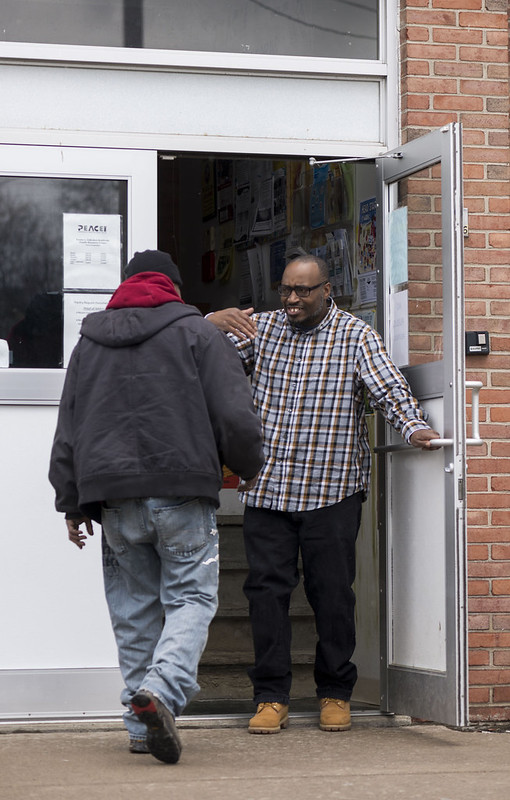
He isn’t alone in that thinking. Ira De’Lee, youth coordinator at Onondaga Earth Corps and Rivers’ friend, said life for them used to be upside down without positive male role models. De’Lee and Rivers go way back: De’Lee offered Rivers his first job out of prison. De’Lee himself has been through the system after the streets took him the wrong way.
“It’s easier to go out, hustle and settle,” he said, almost as a reflection of the fact that crime rates and arrests disproportionately affect the black community. In 2016, black people made up 12 percent of the country’s adult population, but 33 percent of the sentenced prison population, according to the Pew Research Center.
Looking back, De’Lee said the place where he and Rivers are now is phenomenal compared to where they used to be. De’Lee is raising his daughter alone, and a smile spread across his face as he revealed that she is a straight-A student. Raising her alone isn’t easy, but a single parent household is a reality for many.
“They need more fathers involved. More men being an example for transition from streets to real life,” he said. He adds that Rivers is the kind of rare example they need. The support Rivers wants to foster through the center extends to his friendships, too. Every day, De’Lee and Rivers exchange long “good morning” messages wishing each other well and sharing encouragement to make the most of their day and life.
That’s why the job at the Family Resource Center is more than just a job; it’s Rivers’ way of recreating the male presence and support he missed, and that he largely blames for his own years of crime. He spent 30 years in the criminal justice system, 19 of them behind bars on various charges — robbery, grand and petit larceny, criminal mischief and trespass. According to the Bureau of Justice Statistics, about two-thirds of released prisoners get rearrested within three years of release and over 75 percent within five years of release. Rivers went back to prison three times and had served three state sentences before the police — and his lifestyle — caught up with him in 2007 for what he says is the last time.
Pushed from school, lured to the street
Inequalities built into the system were apparent to Rivers even in his early school days, when he observed first-hand the school-to-prison pipeline.
 “We needed ID to get in, we had security guards, metal detectors in school, which prepared us psychologically for prison,” he said. “The only contact I had with white folks was in … medical check-ups, some in school.”
“We needed ID to get in, we had security guards, metal detectors in school, which prepared us psychologically for prison,” he said. “The only contact I had with white folks was in … medical check-ups, some in school.”
Rivers stopped going to school in the ninth grade because school took up too much of the time he’d rather have spent doing the “negative things” he wanted to do. And in the schools, change has come slowly for the 50 percent of students who are black.
The disparity is hard to forget for Rivers, who notices it even today on his visits to Danforth Middle School. He described a dark and dingy building where the air quality is poor and the prospect of improved education — smart boards and new textbooks — seems distant. Combined with the racial disparities in school discipline, he says, the streets today remain an almost welcome alternative to the classroom for too many kids.
“Not going to school was a culture,” Rivers said.
As a boy, Rivers enjoyed reading and the occasional gifts of Atari games over Christmas and his birthday. But not going to school carved out more time for things he’d rather do outside the classroom — what De’Lee called “trouble around the corner.”
About the same time he stopped going to classes, Rivers started using marijuana. By age 17, he got into cocaine and was arrested for the first time for robbery.
Between ages 17 and 42, the criminal justice system consumed most of Rivers’ life. He was angry. Back then, a day would be good in his book if he got his hands on drugs.
The lifestyle didn’t develop overnight, and his feelings soon caught up with him.
“I felt ‘beneath.’ Nobody wakes up and says ‘Imma be a dope fiend or Imma be an alcoholic,’” he said. “That’s something you progress into. You start losing things. You have to take the sun and make it into a cloud.”
Rivers decided some introspection was in order and began studying psychology in prison to better understand himself and his anger. Besides, he didn’t trust the prison administration with any psychological issues because he didn’t want medicine to be the only response.
Apart from studying, he joined an anger management group, where he soon realized what could help him the most.
“The counselor asked me ‘what is it going to take for you not to come back to jail?’” Rivers recalled. “I said ‘education.’”
‘I would like to live by example’
Getting an education was easier said than done. When he came home from prison in 1991 for the first time, Rivers went to Syracuse University for free, but there was no support network around him, no friends or family lending him a helping hand. He went into one of the stores and stole a pair of pants. The store’s buzzer went off, and he got arrested and kicked off the campus.
Rivers tried taking on an accounting degree at Bryant & Stratton College next, but street life won, again. But he was hooked on learning. He became an administrative law clerk and worked in the law library at prison. He got an associate degree in paralegal studies and a degree in psychology with honors. When his brother died after contracting HIV, Rivers became an HIV educator — and it was then that he learned what it was like to help others.
When he got out of jail, Rivers got his first job at Syracuse Haulers Waste Removal, thanks to De’Lee. De’Lee chuckled about Rivers tripping over hammers; construction wasn’t his calling. A year later, Rivers returned the favor by offering De’Lee a job at Onondaga Earth Corps. Support begets support, and that seems to be the way forward for Rivers and the community he hopes to help.
“I really don’t want young folks to follow the path I do. I fear if I don’t do anything, they will,” he said. “I would like to live by an example. I knew what it was not to be a father, husband, man, to be on drugs, to not be a positive figure.”
At one point, Rivers was living only for the prospect of drinking and taking drugs. Indulging his substance abuse was the only way he could forget the stress and worry of being a father and husband. Now, after a full day’s work, he can return to a home with his wife and children, celebrate birthdays. He keeps a photo of his grandchildren near the dashboard of his car.

It took nearly three decades for Rivers to stop running from himself, face the life he had lived and start building a new one. It took a spiritual epiphany, a relentless and determined pursuit of education and a growing support network. The choice Rivers made and the journey to his stability today hasn’t been an easy one. His uncle, James Rivers, also works at the center.
He’s seen his nephew’s journey and is moved by it.
James watched Charles rebuild and rebrand the South Side center from the ground up. As he trudged through the cold basement this past spring, he pointed out the organized chaos of desks, bags and containers. He sat in a lounge room bordering the food pantry upstairs, looking around at the television and the beanbag, knowing that the color and the life of the center would have been dimmer without his nephew’s work.
“I am proud of the Charles of today. He has a compassion for what he’s doing,” James Rivers said. “It takes a lot to do what he does and have the dedication to do it. I couldn’t do it.”
The grind doesn’t stop for Rivers. During this year’s celebration of Earth Day at the center, the skies were blue and cloudless. The children at the center dug their hands through the mud, planting scores of flowers in the front yard.
Rivers, as usual, seemed to be everywhere at once: sifting through mulch and making trips to the store to replace the supply of seeds, a pack of Newport Lights peeking out of his pocket. He cheered on the kids loudly and cursed just as loudly after he lifted a heavy bed of seeds and mud. He held his back for a moment before his eyes landed on the next bed — it was time to get moving again. He hailed one of the kids to help.
“Come on,” he said. “Me and you.”
— Article by Divya Murthy, Staff Reporter
 The Stand
The Stand

